Each year, the Center for the Advancement of Teaching celebrates the recipients of the Distinguished Teaching Awards at the Andrea L. Rich Night to Honor Teaching ceremony held at the Chancellor’s Residence. Unfortunately, due to the COVID-19 pandemic, the ceremony that would have taken place in 2020 was cancelled and the 2020 cohort of awardees was never honored with a Night to Honor Teaching event. This article shines a light on these deserving awardees.
The Distinguished Teaching Awards are UCLA’s highest teaching honor, recognizing individuals who bring respect and admiration to teaching at UCLA. The recipients are selected by the Academic Senate Committee on Teaching and separated into three award categories – six senate faculty members, three non-senate faculty members, and five teaching assistants.
To honor the achievements of the Senate Faculty recipients of the Distinguished Teaching Awards, we are highlighting the exemplary qualities that make these educators serve as role models for their colleagues and the dynamic, innovative approach to their work that inspires our students to a lifetime of learning and achievement.
Tendayi Achiume, Law
Eby Award for the Art of Teaching
Professor Achiume fosters an open and respectful classroom environment in which diverse students can express themselves safely, even in the context of fervent differences of opinion. Her students applaud her ability to handle difficult topics and potentially tense conversations with skill and compassion. She wants the students to understand that they should be learning not only from her, but from each other.
Professor Achiume’s colleagues describe her as “a truly gifted teacher who has the special ability to get students to learn by helping them to arrive at the answers to their own questions, rather than by providing the answers.” She demands a lot from her students and challenges them to think deeply about the role they will play in their legal careers. At the same time, she inspires students and demonstrates a belief in their capacity to be great lawyers who will create change. Her students don’t only learn the material in her courses, they develop confidence in their ability to develop their own answers to the hard questions that can arise in legal practice.
Neveen El Farra, School of Medicine
Professor El Farra uses the Socratic Method to probe the thought processes of learners. This approach requires students to be engaged and to articulate their current state of knowledge, which in turn, helps both the students and her to understand where there are learning gaps that require additional attention. She builds strong relationships with her students based on trust and respect, and creates an environment where students feel safe and motivated to grow.
In Professor El Farra’s role as Associate Dean of Curricular Affairs, she introduced innovations such as team-based learning and flipped classrooms to the pre-clerkship curriculum, as well as creative ways to incorporate simulation training. She has also been a leader in developing new systems of assessment in the era of competency-based medical education.
Marysue Heilemann, School of Nursing
Distinction in Teaching at the Graduate Level
Professor Heilemann believes that learning is one of the most exciting and fulfilling experiences that human beings have in life. She is described as an inspiring teacher, a role model, and a mentor. Her students comment, “she fostered an environment of respect that encouraged participation and kept us engaged in the process of learning,” and “she provides specific, thorough, and kind feedback that exceeded all of my expectations for graduate education.”
Professor Heilemann has had an important role in shaping the curriculum in the undergraduate and doctoral programs at the School of Nursing. Her creation of the social justice approach to nursing education was transformative. She adapts her teaching to individual student’s needs and creates a learning environment in which diverse students can succeed. Professor Heilemann has been an early adopter of the use of technology through the use of “flipped classrooms” and has used a variety of techniques to maximize student interaction including group projects and self-reflective exercises.
David Kim, Department of Germanic Languages
Professor Kim promotes student learning and mentoring as his top priorities at UCLA. He is committed to building learning environments where diverse students flourish and encourages students to reflect upon the world they live in, critically engage with their own identity and subjective lens, and to ultimately create a foundation of mutual understanding and empathy.
He has inspired his students to contribute in meaningful ways to social change. His courses and pedagogical approach are deeply informed by the core principles of the globally oriented, public research university: diversity, civic engagement, social justice, innovation, and inclusiveness. These are the fundamental pillars of his pedagogy, and they comprise the ethical principles that he carries into all of his teaching and wide-ranging community outreach activities.
Tamara Levitz, Department of Comparative Literature
Professor Tamara Levitz has devoted herself to developing pedagogies, research, and courses that explore social justice, equality, inclusion, racial relations, and decolonizing the traditional curriculum. She believes teaching is a process that should reflect the evolving cultures and interests of UCLA’s changing student body. She adapts her pedagogy and course content continuously to take into account recent music, literature, pedagogical approaches, research, performance experiences, and public debates.
Professor Levitz is inspiring to her students, especially those from diverse backgrounds. She mentors them so that they can envision themselves as actual scholars who could have academic careers. Her students express gratitude for her exemplary generosity in sharing her time, feedback, career support and ongoing professional support. She has an intense and lasting effect not just on her students’ intellectual and scholarly development, but on their whole academic life. She instills lasting values in the academic leaders of the future in this country and internationally.
Matthew Lieberman, Department of Psychology
Distinction in Undergraduate Research Mentorship
Professor Lieberman’s mission is to teach social psychology in a way that makes the material personal rather than academic. He inspires students by engaging them in social psychological experiments that provide insights about impression formation, person perception, and the self. Through humor, personal disclosure, and interactive exercises, he gives students a firsthand, immediate experience of social phenomena.
Professor Lieberman states that teaching and mentoring students has been the most rewarding aspect of his career. He connects with his students and supports them through their course work, honors theses, and PhD programs. In teaching students about psychology, he makes sure that they not only learn the science of psychology, but also that they know how to integrate that research into their lives to help them better understand themselves and others around them. He changes the way students view their worlds.
View all the 2020 DTA recipients’ interview clips on the 2020 Night to Honor Teaching page.




